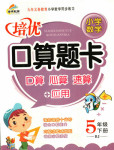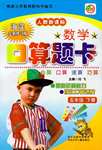题目内容
While listening, remember that it is not __________ to listen only with your ears; you must listen with your brain as well.
A. substantial B. sufficient
C. considerable D. Consistent
练习册系列答案
 培优口算题卡系列答案
培优口算题卡系列答案 开心口算题卡系列答案
开心口算题卡系列答案 口算题卡河北少年儿童出版社系列答案
口算题卡河北少年儿童出版社系列答案 A加金题 系列答案
A加金题 系列答案
相关题目

